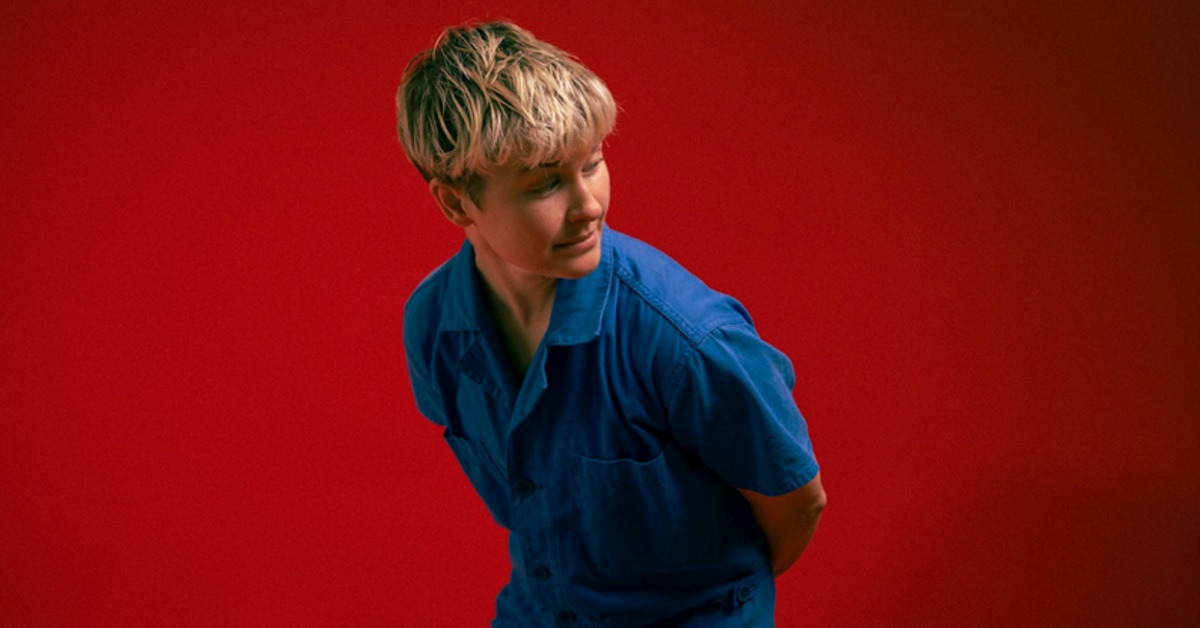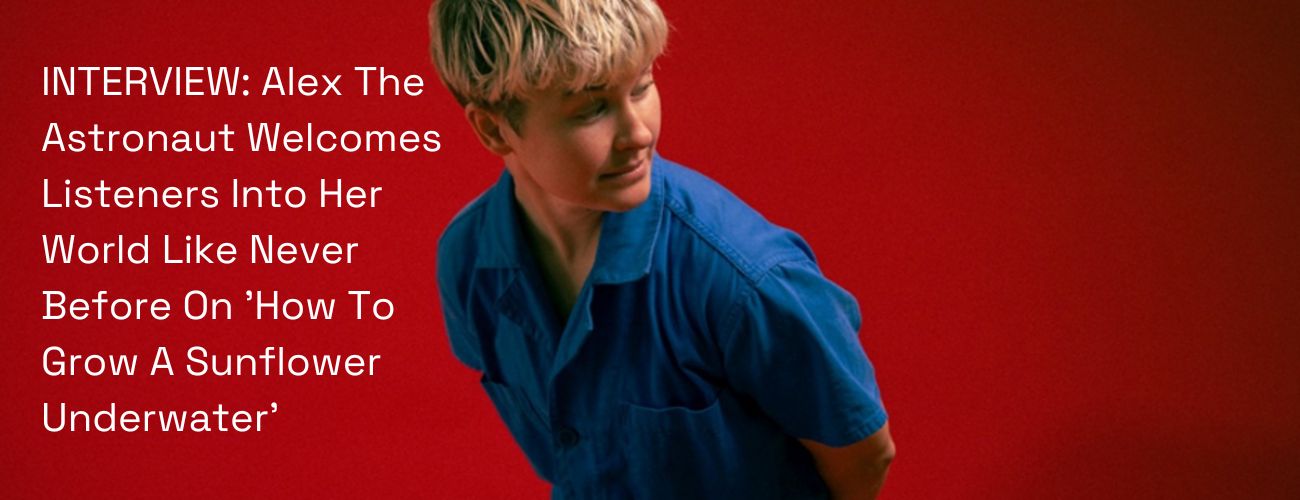



The world's asked a lot from musicians over the last two years. When we speak to Sydney singer-songwriter Alex The Astronaut, she's preparing for her Splendour In The Grass set, as well as getting ready to release her second album, How To Grow A Sunflower Underwater. She's set herself a list of tasks that she needs to get done before the set, a triumphant performance that took place (with a string section in tow) on the Sunday of the festival after wild weather saw the Friday of the festival cancelled.
Describing her feelings heading into the performance and her upcoming tour of Australia, Alex reveals, "I feel like a kid that's going to sleep to wake up on Christmas. It's so fun to be able to know that we're gonna have a real audience and real people singing with us and I get to travel with my band." It's been four years since she toured Australia, and she's used to having to tour on her own. There's a palpable sense of excitement and relief that other people will be there to perform songs from her discography with her (she describes her band as "great friends"). Community is one of the central tenets of How To Grow A Sunflower Underwater, as trying to work through life's problems on your own is often an impossible task.
How To Grow A Sunflower Underwater pairs charming pop soundscapes with at times melancholy and sombre lyricism, a contrast that requires a deft touch. Ride My Bike features lyrical references to a "cracked screen" and a description of how to hit a tennis ball, while the acoustic guitar on Haircut serves as a backdrop for Alex's exploration of gender. Across the album's 10 tracks, Alex gives herself "150 words per song" to dive deeper into her past and present than ever before, and the result is a release that is cathartic for both artist and listener. Alex uses her second album to talk about her Level 1 Autism diagnosis, gender and more, all the while creating worlds that welcome the listener in.
Two years on from her acclaimed debut album, The Theory Of Absolutely Nothing and Alex still doesn't have the answers to life's questions. Then again, does anyone? How To Grow A Sunflower Underwater isn't an album that will solve your problems. It's more of a comforting hug than a source of wisdom, but it doesn't shy away from a reality that many of us know all too well: life can really, really suck. Alex explains, "There's no answer in the whole album. There are suggestions that you talk to your friends, and you share your feelings and you go on these unexpected paths where there are really, really difficult things.
"However, the main answer, like if you get to the end of the album, is there's gonna be really hard stuff. It's going to keep happening, and there's nothing you can do about that, which is kind of a depressing takeaway. How do you keep hope in that? You keep it by going out with your friends, drinking tea, breathing. There are these little things that we can do to try and make our lives worthwhile and hopeful. You've got to keep doing them, otherwise, you're going to lose hope. The sunflower part is the hopeful part. So just Yeah. All the way through, but amongst all of these big, heavy, traumatic, scary events."
These traumatic events are explored in detail on How To Grow A Sunflower Underwater. Sick tells the story of a loved one's experience with a terminal illness, featuring heartbreaking lyrics like "If one more person tells me that I'm brave or you look healthy/I might lose my shit or something I don't know". Alex's music might appear to have a cheerful veneer, but repeat listens reveal trauma and pain that doesn't simply go away when the album is done. Similarly, South London is a reflection on the way one's youthful memories don't always contain the full truth - "There's a dark side of London my parents tried to hide/But I remember seeing people sleeping outside".
Rather than reaching for sweeping statements that are designed to dull the pain of her experiences, Alex reveals that when writing the songs on How To Grow A Sunflower Underwater, she wanted to showcase vulnerability. She explains, "Lots of times, I tried to work out what I wanted to say. What's the solution? What's the vulnerability in it that needs to be shared? I was realising that it's not really about making some big claim of 'I'm this or I'm that. This is what gender I'd like to be talked about as' or anything like that. It wasn't really the point of the song. It was just a journey of discovery. And then the vulnerability was actually being on that journey, rather than getting to some sort of statement. I was playing with that throughout the album and that's one thing that I really wanted to keep consistent."
Alex's vulnerability has always been something that has stood out, but it's more prevalent than ever on How To Grow A Sunflower Underwater. Throughout Alex's discography, she's often told the stories of others. She tells the aching yet touching story of a couple that part ways on William and Georgia, while The Theory Of Absolutely Nothing track I Like To Dance talks about domestic abuse. On How To Grow A Sunflower Underwater, she sings from a personal perspective more than ever before, and the music's emotional potency has risen even further as a result. Alex explains, "I just had had so many stories that I've experienced over the previous two years. To tell it accurately, I wanted to make it a whole journey so that people could follow it from beginning to end, rather than jumping and pretending that they were experienced by someone else."
The album's sense of community is perhaps best understood through Sam, Dean and Dan from beloved Brisbane band Ball Park Music's involvement in its making. They co-produced How To Grow A Sunflower Underwater, while their voices can be heard at the end of the album version of Airport. Sam and Dan co-produced A Theory Of Absolutely Nothing, but Dean's addition came about after Alex's guitar lessons with him. She recounts working with the trio on How To Grow A Sunflower Underwater, explaining, "I realised that Dan relaxes a lot more around Dean, and I could see that he would add a different kind of personality to the mix. Dean is a bit quieter than Dan. It was important to work out what personalities would be really nice to have in the room, and his guitar skills are incredible. It naturally came together."
We change tack a little bit and ask her opinion on the James Webb telescope and the mesmerising photos that were recently released. As they do for many, the photos are comforting for Alex, and she says," I love it. On Earth, obviously, there are all of these horrible things happening. It's nice to get another view." She also tells us the story of Freya, the Norwegian walrus that has been sinking boats in the Oslo fjord. It's a fitting tale given the presence of aquatic references across How To Grow A Sunflower Underwater: the bubbly sound effects on Octopus are particularly joyful, while the album's title stems from Alex's frequent snorkelling sessions through lockdown.
Alex's sense of resilience shines through in an anecdote she tells about creating the album's artwork alongside Giulia McGauran, who Alex describes as a "magician". The photo sees Alex falling, but in order to take the photo so Giulia could paint the cover, they needed to get creative. While Giulia was on Zoom, Alex and her manager arranged a makeshift set-up in their backyard, with Alex doing a backwards sit-up on a stool. From there, Giulia used the photo as a reference to paint the artwork and "made it into what it is now". Each single cover contains elements of the album art, with the colours featured in the single artworks referencing the colour palette of How To Grow A Sunflower Underwater's cover. The artworks for Octopus and Haircut are both predominantly blue, while Airport's cover is strikingly red. No stone has been left unturned when it comes to bringing Alex's vision for How To Grow A Sunflower Underwater to life, and it shines through in both her work and the work of her community. There's no use in trying to do everything alone.
Central to the album is a line on South London: "so much stays, so much changes". Over the last two years, both Alex The Astronaut and Alexandra Lynn have experienced a lot of what life can throw at anyone. She points to the songwriting of Gang Of Youths lead singer David Le'aupepe as a reference, explaining that while most might not have experienced life in the same way as him, people can still emotionally connect with Gang Of Youths' music. She explains, "When we hear his songs, you relate to them in a way that you get to feel all the hard stuff that you've been through, whatever that might be, and you really understand what he's talking about, even though you've never been anywhere near it.
"For the album, I wanted to create an environment where that might happen for people. That involved getting a shitload of strings, getting those orchestral moments and trying to make sure the arrangements and the wording were vivid and expressive." How To Grow A Sunflower Underwater is, at its core, an album that's both for herself and everyone else. After you're finished listening, reach out to a friend for a cup of tea. We're all in this together.



Welcome to Cool Accidents' mailing list.
Customize your notifications for tour dates near your hometown, birthday wishes, or special discounts in our online store!